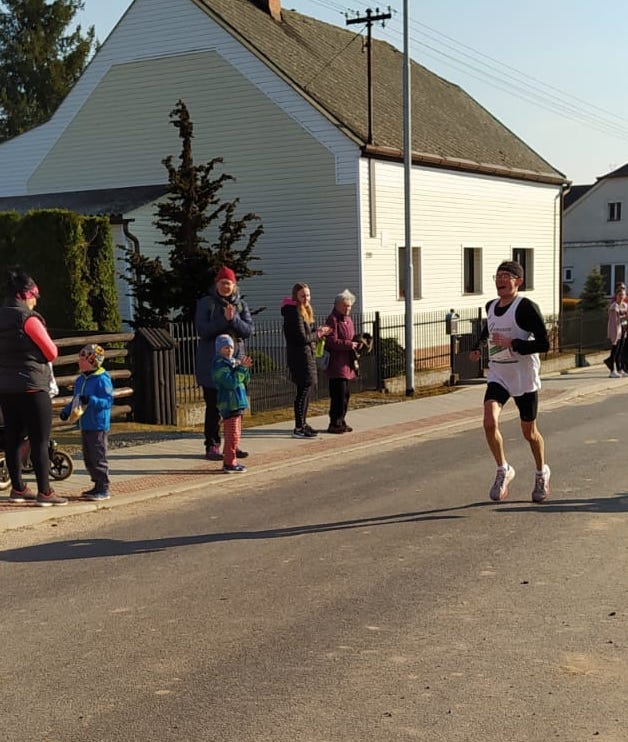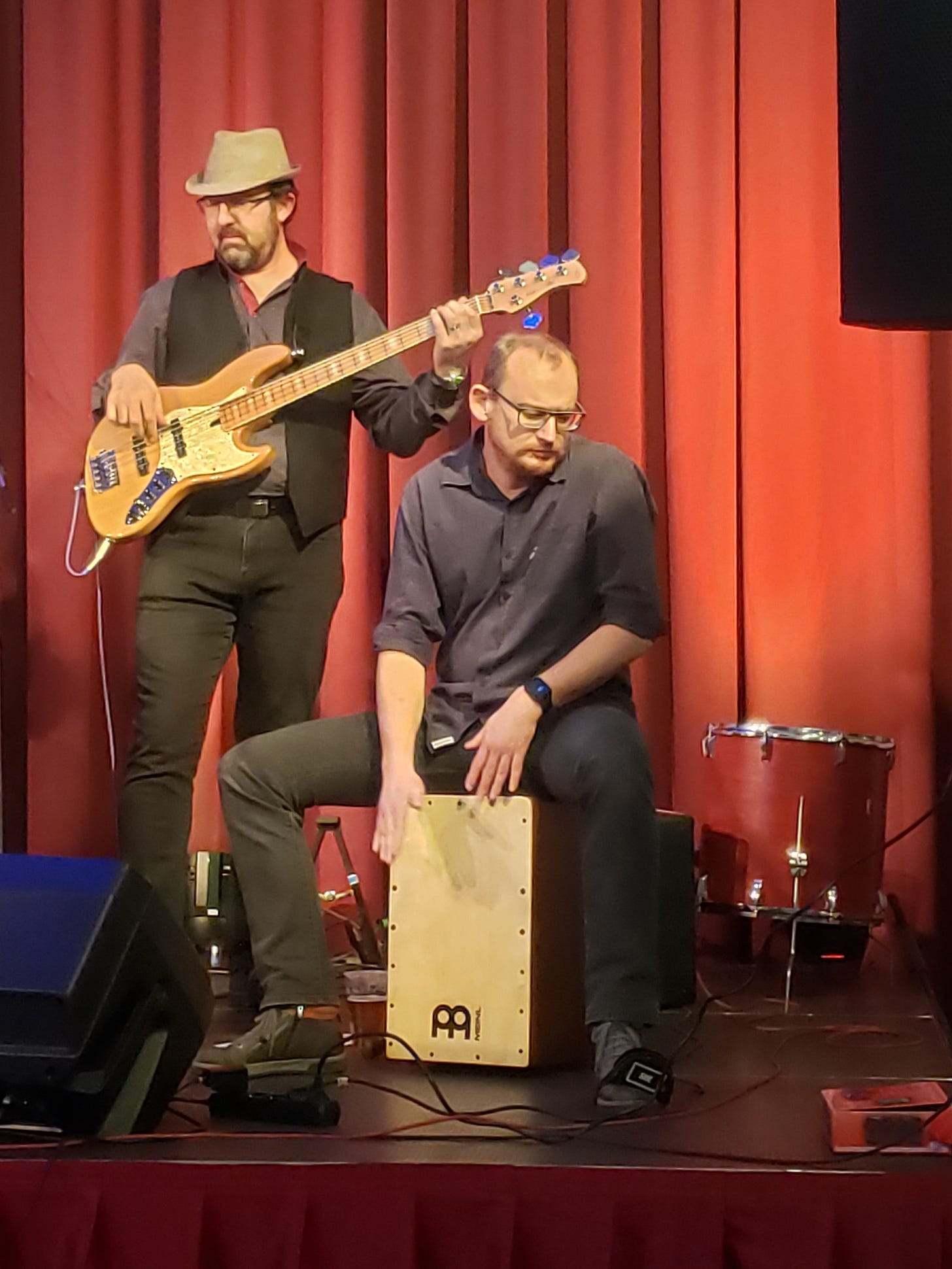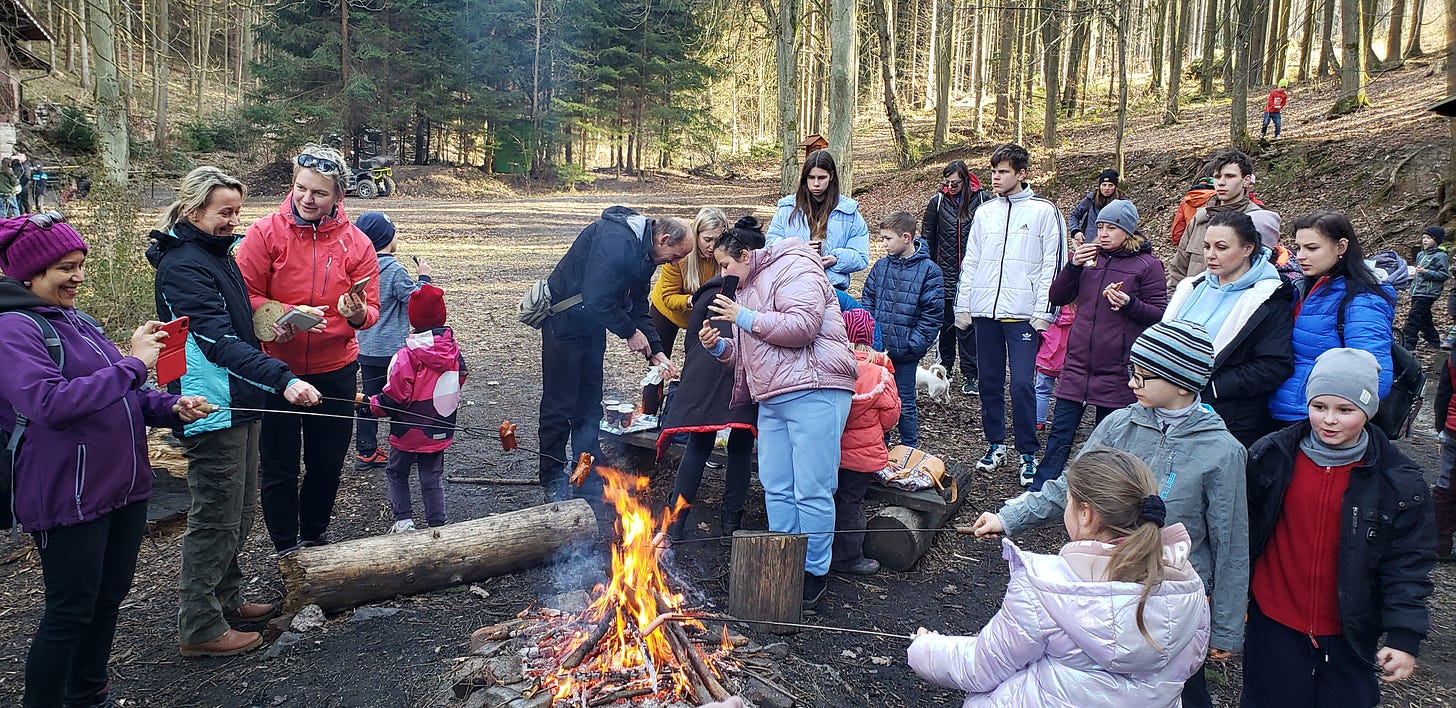This weekend I was fortunate enough to participate in a few community events that lent a certain feeling of home to Moravská Třebová. On Saturday, I competed in a local 10km race which reaffirmed my love of running. In the evening, my colleagues brought me along to see another colleague and his band perform in the nearby city. And on Sunday afternoon, I joined some residents of the town as well as some Ukrainian refugees on a hike to Peklo, a place for campfires and refreshment in the middle of the woods. On my run this morning I was reflecting on just how comforting this weekend was.
It seems to me that just as the ability to sit in silence with another is the sign of a strong relationship, so too is the ability to be in one place without the compulsion to keep moving is the marker of feeling at home. For much of the first half of my Fulbright year, I took to the streets and skies of Europe looking for adventurous new experiences. I became increasingly frustrated that I wasn’t having a good time doing it. I would be in Barcelona, Prague, or Milan and would want nothing more than to be home. I was doubly upset. First, because I was far from home and having a lousy time. Second, because I wasn’t enjoying what everyone told me to enjoy, what everyone assured me was enjoyable. I took it as a personal shortcoming; I told myself I was a bad tourist, not that tourism is sometimes incredibly deadening.
To be sure, I’ve had many wonderful experiences traveling around the continent and I don’t regret taking trips to other countries. However, the more I’ve tried to force enjoyment onto every experience, the more such enjoyment seemed to elude me. I have come to realize that I wasn’t really living in the Czech Republic until recently when I could spend a weekend here in Moravská Třebová and not feel some restless itch to be somewhere else. I was merely a tourist who had to teach a few lessons each week. Shifting my focus away from merely visiting and towards living and residing has given me immense comfort and, as I said, lent this place a special feeling of home.
Deset Jarních Kilometru
In many ways, Czechs seemed to be more firmly rooted in their communities than Americans. As politics in America nationalizes and as culture globalizes, it is easy to treat these things as spectator sports with all the fandom, rivalry, and even hostility that such a comparison entails. Cooperation gives way to competition. When the community is the first thing that occupies the focus of a citizen, a paradox occurs where both the individual is granted more agency and the collective is strengthened as well.
All around town are these bulletin boards that advertise local events like hockey games or concerts in the town square. Much of this advertising has, in less community-oriented places, been outsourced to Facebook which is useful for cutting down on material waste, but also runs the risk of siloing a community into a network of loosely connected webpages. Here, because much of the culture of the town revolves around these bulletin-board events and is further spread by word of mouth, the events are to some degree better organized.
I was walking by one such bulletin board a few weeks ago and saw a poster for a local 10km race in the neighboring village of Kunčina. On a whim, I signed up, thinking that even if I embarrassed myself in the race, I would still be among a community I recognize and feel at home in, the running community. Fortunately, and a little to my surprise, I did not embarrass myself and came away the victor, finding a group of people who were similarly elated by the return of Saturday race days.
I never feel more like myself than when I am running. And I never feel more alien to myself than when I am in a foreign city, lying awake in a hostel bed, buzzed from whatever the booze is they insist I try in Barcelona, or Krakow, or Florence. Almost by definition, you cannot feel at home as a tourist, and for this very reason, I have come to cherish simply spending the weekend in my small town here, running through the woods or lamenting the early closure of restaurants or fumbling my way through grocery store check-out aisles.
When I travel, my running goes to shit. I convince myself that I don’t need to run, or that I need to maximize my time in such-and-such city. There are two obvious errors in this way of thinking. One, I’ve always needed to run if for no other reason than to stay sane. And two, running is a fantastic way to see more of a city than you would otherwise simply wandering around. Staying in Moravská Třebová this weekend not only let me inhabit that feeling of home that running gives me, it deepened my connection to the place I’ve been living for over seven months now. I’m also a few thousand crowns richer and I’ve got a celebratory bottle of pilsener in the fridge.
Svitavy Ukelele Ensemble (S.U.E.)
After the 10km, two of my colleagues went to the nearby city of Svitavy to watch our friend Pepa and his band perform covers of popular Czech and American songs with six other guys on ukelele. Pepa, the humble man that he is, played the Cajon with the reverence of an entire rhythm section. Though I was quite tired from the race (and the beer that was handed to me within seconds of arriving) the live music pulsated undeniable energy through me. Sure, they lost me a bit with the Czech hits, but hearing songs live and in English totally revived even some of the deadest of tracks for me. I mean, I really do despise the song “I’m Gonna Be” by The Proclaimers but you better believe I was the guy walking 500 miles just to be the guy who did.
Suddenly, I am the biggest fan of R.E.M because theirs is the music that became immensely popular here following the Velvet Revolution drove out the oppressive communist regime in 1989. It’s intriguing that much of what remains popular here are those first forays into western culture that were made when the Soviet Union retreated and then collapsed in the late 1980s. A lot of my part of Czechia feels like a time-capsule for the fall of communism.
The bands that played on Saturday evening were local ones of middling success, but you would have thought they had booked Ed Sheeran. The passion these performers had for their music and the connection to the place they shared with the audience created an atmosphere of a stadium concert, scaled to the rather small club we found ourselves in. The power of smaller-scale events like this does not diminish the profound energy of larger-scale events like political rallies or World Cup matches, but when all of our attention is wrapped up in the latter, we can lose track of just how special the former can be.
A walk in the woods to Peklo
On Sunday afternoon after my run, I went with Hana and her daughter Verunka to the woods behind the school where I teach to hike up to Peklo with a group of Ukrainian refugees that have been staying on campus for the time being. When I came home to write again about how the war looked from here in Moravská Třebová, all I could come up with were these reflections from my weekend here in town. I don’t want to suggest that people are not capable of caring about those who they cannot see, but today, the whole mess of war and human suffering was brought home to me in a way that newsreels and headlines have not yet done.
The walk was put together by my friend Adela’s husband and, through Adela, we were able to talk to some of the Ukrainian folks about the war, but also anything but the war as such a topic can bring about great pain for many. I spoke to a young woman around my age from Kharkiv about what it was like leaving home and though she remains optimistic about returning home someday our conversation kept pushing towards tears and sadness. At one point, she took out her phone to show me pictures of the destruction wrought in her home city. These are what I’ve come to call slap-in-the-face moments. You don’t get them on RyanAir or in the next city’s art museum. You get them when your home is both near and far away at the same time.
From what I could gather, Czechs and Ukrainians understand what is being said by each other but don’t know the other language well enough to respond. So, as we went around the campfire at Peklo, vacillating between Czech, Russian, Ukrainian, and English, we wove a fabric of community that doesn’t sacrifice the individual spirit but welcomes it into the fold. We all want to be able to go home someday, but when that is no longer an option, the tendency to remake a place in the image of home is a near necessity. Because home is where you can be yourself and watch your self melt away.
This is what I think I finally achieved this weekend. As we sat around the campfire, some roasting sausages, others playing guitar, I felt a rootedness I haven’t felt since leaving home seven months ago. What we did together today wasn’t charity in the typical, material sense. Nor should it have been. Charity feels redemptive, like an aim at recovery. But we cannot recover what has been lost, we can only make something new in its place. That feels more appropriate for what I’ve been trying to do here in town: to carve out a new place to live and grow. And much like a plant, a community can only grow when the water of life reaches its roots.





There is no better feeling than the feeling of “home”. Watching you delve in and rooting yourself has been a fascinating journey for us all, Sean. You have such a way with your writing that leaves us all wanting more and more! Cheers to your next local adventure! 🍻
Loved reading this, Sean! Think of you often 💚